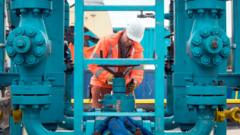Is Fracking the Future? Reform UK Challenges Energy Firms to Prepare!

Published: 2025-08-25 05:07:07 | Category: technology
A potential energy resource known as shale gas has been a contentious issue in UK politics for over a decade, primarily due to the controversial extraction method known as fracking. Various governments have imposed bans on fracking due to environmental concerns, including the risks of earthquakes and pollution. However, Reform UK, a political party led by Richard Tice and Nigel Farage, is pushing to revive fracking, claiming it could unlock substantial economic benefits. This article explores the history of fracking in the UK, the political dynamics surrounding it, and the potential future of shale gas extraction.
Last updated: 28 October 2023 (BST)
Key Takeaways
- Shale gas extraction through fracking has faced significant political and public opposition in the UK.
- Reform UK aims to revive fracking, claiming it could boost the economy by billions and create jobs.
- Past attempts at fracking have led to environmental concerns and planning delays, limiting progress.
- Labour's current government is focused on renewable energy and has committed to a permanent ban on fracking.
- The geological challenges of UK shale gas extraction may make it less economically viable compared to imported gas.
The Rise and Fall of Fracking in the UK
Fracking, short for hydraulic fracturing, involves injecting high-pressure fluid into underground rock formations to release natural gas. In the UK, fracking gained attention around 2010 as a potential means of energy independence, following a shale gas boom in the United States. The initial optimism from UK politicians, including former Energy Minister Charles Hendry, was quickly dampened by the reality of operational challenges.
The UK has a history of fracking dating back decades, but it remained largely unnoticed until the US experience drew attention to its potential. Early support from politicians was tempered by the realisation that UK geology presents unique difficulties. Charles Hendry, who once viewed fracking optimistically, has since become a sceptic, stating that the issues of planning delays, legal challenges, and public protests severely hindered the industry's progress.
Political Resistance and Environmental Concerns
Fracking has been banned multiple times since 2011 due to concerns about its environmental impact, particularly the risk of induced seismicity—small earthquakes triggered by the injection of fluids into the ground. The most significant setback occurred in 2019, when tremors were reported at a fracking site in Lancashire, leading to an immediate ban on all fracking activities.
Former Prime Minister David Cameron's attempts to ignite a "shale gas revolution" faced numerous obstacles, resulting in a sharp decline in fracking activities. Legal challenges and public protests have consistently undermined government efforts to promote fracking, revealing the complexities of navigating public opinion against the backdrop of energy needs.
Reform UK’s Ambitious Plans for Shale Gas
In contrast to the Labour government's commitment to renewable energy, Reform UK is advocating for a revival of the fracking industry. Richard Tice, the party's deputy leader, has stated that leaving shale gas untapped is financially negligent, arguing that the UK possesses "hundreds of billions of energy treasure" beneath its soil. Tice asserts that a Reform UK government would lift the fracking ban and collaborate with energy firms to explore shale gas extraction.
Promising Economic Benefits
Reform UK points to studies suggesting that the shale gas in regions like the Gainsborough Trough could provide a significant boost to the UK economy. An analysis by accounting firm Deloitte estimated that the gas in this area could be worth £140 billion and create approximately 250,000 jobs. However, this data remains unverified as it has not been publicly released.
Despite the potential economic benefits, experts caution against overly optimistic projections. Michael Bradshaw, a professor of global energy at Warwick Business School, has highlighted the complexities and costs associated with extracting shale gas in the UK, noting that it is likely to be more expensive than importing gas from established producers like Norway.
Challenges Ahead for Reform UK
One of the most significant hurdles Reform UK faces is the entrenched opposition to fracking. The party's plans to lift the ban and encourage exploration may be met with resistance from both environmental groups and the general public, who remain concerned about the ecological implications of fracking. Furthermore, political analysts suggest that even among Reform UK's voter base, there may be significant opposition to a revival of fracking.
Additionally, the recent history of fracking in the UK serves as a cautionary tale. When former Prime Minister Liz Truss attempted to lift the fracking ban in 2022, she faced immediate backlash from within her own party, leading to a rebellion that ultimately contributed to her resignation. Her successor, Rishi Sunak, reinstated the moratorium on fracking, indicating the fragility of support for the practice within the Conservative Party.
Geological and Economic Viability
The British Geological Survey (BGS) has identified four key areas in the UK with potential for shale gas extraction, primarily located in Lancashire and parts of the Midlands. However, the BGS has also warned that without further testing, it cannot be confirmed whether these areas are economically viable for shale gas production. The geological complexities of the UK’s shale basins may render extraction significantly more challenging and costly than in the US, where the industry has flourished.
What Lies Ahead for UK Energy Policy?
As the UK navigates its energy future, the debate over fracking will likely continue to be divisive. Labour's commitment to renewable energy and a ban on fracking reflects a broader trend towards sustainability, while parties like Reform UK seek to capitalise on untapped fossil fuel reserves. The outcome of the next general election will be pivotal in determining the UK’s energy policy direction. If Reform UK gains power, it may find itself at odds with both public sentiment and the global shift towards cleaner energy sources.
The Future of Energy in the UK
Experts suggest that while fossil fuels will remain part of the UK's energy landscape for years to come, the long-term focus is shifting towards renewable energy. Labour's goal of achieving 100% clean electricity by 2030 underscores this transition. The potential for fracking to lower energy costs or contribute to national energy security appears limited in the context of this green shift.
Conclusion
The future of shale gas extraction and fracking in the UK remains uncertain amidst political turmoil and environmental concerns. As Reform UK rallies support for its plans, it is met with significant challenges that have thwarted previous attempts at developing this resource. The landscape of UK energy policy is evolving, and with environmental sustainability at the forefront of public consciousness, the push for fracking may find itself increasingly isolated. Will the UK embrace its shale gas potential, or will it continue to pivot towards renewable energy sources? The next few years will be crucial in shaping the country’s energy future.
FAQs
What is shale gas and how is it extracted?
Shale gas is a natural gas found trapped within shale formations. It is extracted using hydraulic fracturing (fracking), which involves injecting high-pressure fluid into the rock to create fractures that release the gas.
Why has fracking been banned in the UK?
Fracking has been banned in the UK due to environmental concerns, particularly the risks of induced earthquakes and potential water contamination, as well as public opposition and legal challenges.
What economic benefits does fracking offer the UK?
Proponents of fracking argue that it could unlock significant economic benefits, potentially generating billions in revenue and creating thousands of jobs in the energy sector. However, experts warn that the actual costs and feasibility may limit these benefits.
What is Reform UK's position on fracking?
Reform UK advocates for lifting the fracking ban and encourages exploration for shale gas extraction, claiming it could provide a substantial economic boost. They propose working with energy companies to test the viability of shale gas production.
How does Labour's energy policy differ from Reform UK's?
Labour's energy policy focuses on renewable energy and aims to ban fracking permanently, promoting a transition to clean energy by 2030. In contrast, Reform UK supports reviving fracking as a means to tap into domestic energy resources.



